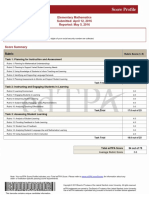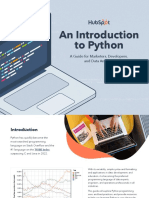Pathways into Python Programming
Uploaded by
trust ayeniPathways into Python Programming
Uploaded by
trust ayeniPathways into Python Programming: A Comprehensive Discussion
Introduction
Python is one of the most versatile and widely used programming languages in the world. It is known for
its simplicity, readability, and vast ecosystem, making it a top choice for beginners and experienced
programmers alike. Python is used in various domains, including web development, data science,
cybersecurity, automation, and artificial intelligence. There are multiple ways to learn Python, including
formal education, certification-based learning, and self-directed experience. This discussion explores
these pathways and their advantages.
Formal Education Pathway
Pursuing a formal education in computer science, software engineering, or data science provides a
structured way to learn Python. Many universities incorporate Python into their curricula due to its
growing importance in the industry. Some benefits of this approach include:
1. Strong Theoretical Foundation – Degree programs cover fundamental programming concepts,
data structures, algorithms, and software development practices.
2. Access to Academic Resources – Students have access to research opportunities, mentorship,
and collaborative projects that enhance learning.
3. Better Career Prospects – Many companies prefer candidates with formal education, especially
for roles in software engineering, data science, and AI development.
While formal education provides credibility and depth, it may not be the fastest or most flexible route for
learning Python. Many individuals opt for alternative methods to gain proficiency in Python
programming.
Certification-Based Learning Pathway
Certifications and online courses offer a structured way to acquire Python skills. These programs provide
a guided curriculum and industry-recognized credentials. Some popular Python certifications include:
1. Python Institute’s PCEP and PCAP Certifications – Focus on fundamental and intermediate
Python programming skills.
2. Google IT Automation with Python – Covers automation, scripting, and working with APIs.
3. IBM Python for Data Science – Provides training in Python for data analysis, machine learning,
and AI.
4. Microsoft Python Certification – Focuses on Python development and its applications in cloud
computing.
Certifications are particularly useful for career transitions and validating Python expertise in specialized
fields such as automation, data science, and software development.
Self-Directed and Hands-On Experience
For individuals who prefer a practical and flexible approach, self-directed learning is a highly effective
pathway into Python programming. Some key strategies include:
1. Working on Real-World Projects – Building applications such as web scrapers, automation
scripts, or machine learning models helps reinforce Python skills.
2. Contributing to Open-Source Projects – Platforms like GitHub offer opportunities to collaborate
on Python-based projects and gain hands-on experience.
3. Engaging in Coding Challenges – Websites like LeetCode, HackerRank, and CodeWars provide
coding problems to enhance problem-solving skills.
4. Joining Python Communities – Participating in Python-related forums, attending meetups, and
engaging with professionals on platforms like Stack Overflow and Reddit can help in skill
development and networking.
The self-directed pathway requires discipline but allows learners to gain practical skills and build a
portfolio that demonstrates their expertise. Many successful Python programmers have entere
You might also like
- 2021-Buku Standar English Test Preparation 2021-Lbipu Ums67% (3)2021-Buku Standar English Test Preparation 2021-Lbipu Ums266 pages
- Python Programming for Beginners: A Comprehensive Crash Course With Practical Exercises to Quickly Learn Coding and Programming for Data Analysis and Machine LearningFrom EverandPython Programming for Beginners: A Comprehensive Crash Course With Practical Exercises to Quickly Learn Coding and Programming for Data Analysis and Machine Learning4.5/5 (6)
- Why Students Should Get Python Programming Classes OnlineNo ratings yetWhy Students Should Get Python Programming Classes Online4 pages
- Python Mastery Unleashed Transform Your Tech Journey With Gurgaon's Premier Training Hub!No ratings yetPython Mastery Unleashed Transform Your Tech Journey With Gurgaon's Premier Training Hub!4 pages
- Why Python?: Professional Diploma in Python ProgrammingNo ratings yetWhy Python?: Professional Diploma in Python Programming7 pages
- Hamoye Data Science Internships Handbook Spring 2024No ratings yetHamoye Data Science Internships Handbook Spring 202429 pages
- What Are The Major Uses of Python in 2022No ratings yetWhat Are The Major Uses of Python in 20223 pages
- Top 20 Python Certification Guide 2024 (Free and Paid)No ratings yetTop 20 Python Certification Guide 2024 (Free and Paid)13 pages
- VBFNM, L, Lmnbgvcfdxszasdfghjk, LKMJHGFDNo ratings yetVBFNM, L, Lmnbgvcfdxszasdfghjk, LKMJHGFD20 pages
- Learning Python With The Learning Company A Transformative JourneyNo ratings yetLearning Python With The Learning Company A Transformative Journey8 pages
- Bey Z., Whittaker S. B. - A Masters Course in Python With Certification - 2023No ratings yetBey Z., Whittaker S. B. - A Masters Course in Python With Certification - 2023187 pages
- 7 Beginner To Python Pro - Your Guide On How To Become A Python Developer - TAKEONo ratings yet7 Beginner To Python Pro - Your Guide On How To Become A Python Developer - TAKEO3 pages
- The forest was alive with the sound of rustling leaves and the occasional snap of a twig underfootNo ratings yetThe forest was alive with the sound of rustling leaves and the occasional snap of a twig underfoot3 pages
- Data Scientist Master Program Brochure Simplilearn - V2 - 14-06-2024No ratings yetData Scientist Master Program Brochure Simplilearn - V2 - 14-06-202428 pages
- Technical Text- Programming Language PytthonNo ratings yetTechnical Text- Programming Language Pytthon3 pages
- Learn Python: Get Started Now with Our Beginner’s Guide to Coding, Programming, and Understanding Artificial Intelligence in the Fastest-Growing Machine Learning LanguageFrom EverandLearn Python: Get Started Now with Our Beginner’s Guide to Coding, Programming, and Understanding Artificial Intelligence in the Fastest-Growing Machine Learning Language5/5 (3)
- Basic Elements of Individual Behavior in OrganizationsNo ratings yetBasic Elements of Individual Behavior in Organizations38 pages
- Attitude Towards Life Among Secondary School Students in Relation To Their Parenting StylesNo ratings yetAttitude Towards Life Among Secondary School Students in Relation To Their Parenting Styles8 pages
- Ayu Astuti Mellanie Prasticia Y. Shella Claudia B.S. Tazkia Tiara I. TitiNo ratings yetAyu Astuti Mellanie Prasticia Y. Shella Claudia B.S. Tazkia Tiara I. Titi7 pages
- EFL Graduate Students' IELTS Writing Problems and Students' and Teachers' Beliefs and Suggestions Regarding Writing Skill ImprovementNo ratings yetEFL Graduate Students' IELTS Writing Problems and Students' and Teachers' Beliefs and Suggestions Regarding Writing Skill Improvement12 pages
- Servant Leadership Is Getting To The Root of Positive Forms of Leadership, A Leader Is A Servant FirstNo ratings yetServant Leadership Is Getting To The Root of Positive Forms of Leadership, A Leader Is A Servant First24 pages
- Friends or Foes: Is Empathy Necessary For Moral Behavior?: Jean Decety and Jason M. CowellNo ratings yetFriends or Foes: Is Empathy Necessary For Moral Behavior?: Jean Decety and Jason M. Cowell13 pages
- Achieving Success On The Uceed Exam: Everything You Need To KnowNo ratings yetAchieving Success On The Uceed Exam: Everything You Need To Know3 pages
- What Is A Phrase?: "After Dinner" "Waiting For The Rain To Stop"No ratings yetWhat Is A Phrase?: "After Dinner" "Waiting For The Rain To Stop"3 pages
- Unit_16_Computing_Research_Project_RQF22No ratings yetUnit_16_Computing_Research_Project_RQF228 pages

























































































